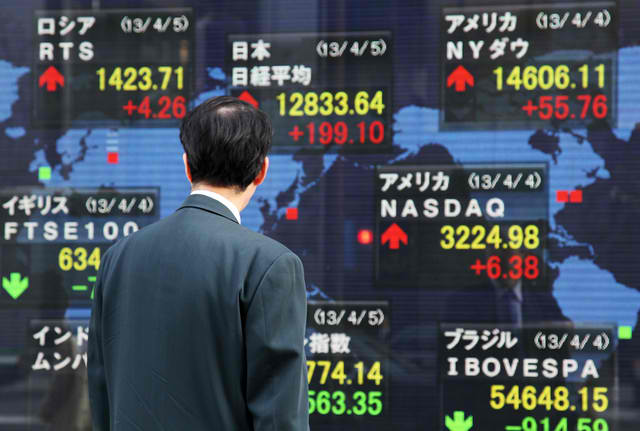
Stocks in Asia were higher in Wednesday afternoon trade following a report that said the U.S. and China are closer to reaching a trade agreement.
Hong Kong’s Hang Seng index gained 0.86 percent, as shares of Chinese tech giant Tencent jumped 2.4 percent — it had earlier reached its highest level since the last intra-day high on August 10.
The Nikkei 225 in Japan added 0.84 percent in afternoon trade as shares of index heavyweight Fast Retailing soared almost 5 percent. The Topix index rose 0.52 percent.
Over in South Korea, the Kospi gained 0.6 percent as chipmaker SK Hynix saw its stock jump more than 2 percent.
Mainland Chinese stocks, however, were tepid by the morning session’s end, with the Shanghai composite advancing 0.23 percent. The Shenzhen component and Shenzhen composite were largely flat.
Meanwhile, the ASX 200 in Australia rose 0.65 percent. Data on Wednesday showed that retail sales Down Under hit a 15-month high in February, with the country’s trade surplus soaring beyond expectations to its second highest on record in the same month.
The broad MSCI Asia ex-Japan index advanced 0.69 percent to 539.56, as of 12:27 p.m. HK/SIN.
The U.S. and China are set to resume trade negotiations in Washington on Wednesday, following last week’s talks in Beijing. Ahead of the meeting, White House economic adviser Larry Kudlow said the two countries “expect to make more headway ” in this week’s talks.
Both economic powerhouses are closer to reaching a deal, according to a Wednesday report from the Financial Times.
Myron Brilliant, executive vice president for international affairs at the U.S. Chamber of Commerce, told reporters that 90 percent of the deal is done, but the final 10 percent remains the trickiest part of the negotiations and would require trade-offs on both sides, according to the Financial Times report.
“There will be a deal done this time,” Sean Taylor, chief investment officer of Asia Pacific at DWS, told CNBC’s “Street Signs” on Wednesday. “It will be very difficult to implement but it will change sentiment and it will get both parties, you know, back (to) being more pleasant to each other and … it will get trade going again.”
If a deal is reached, he said, the focus would shift toward what he termed the “trade war two” centered around the disputes on technology and intellectual property.
Taylor also noted that it was “ironic that the markets are going up.”
“We’re now getting downgrades from some of the big global agencies like the IMF on growth and yet the markets are sort of pricing in better news. I think that’s quite an interesting point,” Taylor said.
The U.S. dollar index, which tracks the greenback against a basket of its peers, was at 97.204 after seeing highs around 97.5 yesterday.
The Japanese yen traded at 111.48 against the dollar after seeing highs below 111 earlier in the trading week.
The Australian dollar was at $0.7098 as it attempted to recover after tumbling from the $0.711 handle in the previous session, following a statement from the Reserve Bank of Australia (RBA).
While the bank kept its policy cash rate unchanged at 1.50 percent this time, RBA Governor Philip Lowe said in its monetary policy statement that the bank would “continue to monitor developments and set monetary policy to support sustainable growth.”
That statement, replacing previous language about holding the stance of monetary policy, Rodrigo Catril, senior foreign exchange strategist at National Australia Bank wrote in a morning note, was interpreted by the market “as a nod to being open about considering future rate cuts.”
The Australian central bank’s acknowledgement “for the first time that the housing downturn is weighing on consumption” also added to “the sense of a dovish tilt” at the RBA, Catril said.
Oil prices were higher in the afternoon of Asian trading hours. The international Brent crude futures contract gained 0.49 percent to $69.71 per barrel, while U.S. crude futures rose 0.3 percent to $62.77 per barrel.
